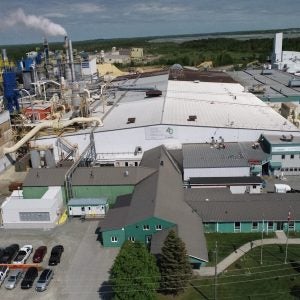Weyerhaeuser has brought together its own forest management expertise with northern Uruguay’s fertile soil and favourable climatic conditions, to produce high-quality raw material to make a range of solid and panel products for export. Today, around 80% of the group’s forest estate in Uruguay is pine, but development of eucalypt hardwood in Latin America is high on the agenda. If its hardwood products take off in the US market, the plantation species balance could change to a 50:50 split, predicts Weyerhaeuser’s Latin America executive director Marvin Ray Risco. "One of our key aims, and the reason we’re focusing on eucalyptus is as an alternative to the tropical or endangered hardwood species. "If you look at the declining supply of Malaysian and Indonesian meranti, this is a natural substitute product … that creates an opportunity for a company like ours that has already placed its bet in Uruguay," explained Ray Risco who only took charge of Latin American operations last year.
With its Uruguayan timber base established, Weyerhaeuser is into the industrial development phase of the project with its completion of a new US$40m plywood mill in Tacuarembó this year. The 130,000m3/year plant, which began debarking, peeling and drying veneers in May, was in the final stages of construction when WBPI travelled to northern Uruguay to visit Weyerhaeuser’s 200ha Tacuarembó industrial site. In mid-June the company was completing the lay-up and finishing sections, with full mill start-up scheduled for mid-July. This plant is just the first step in an US$800m expansion programme which envisages the construction by the group of at least five sawmills, plywood plants and other wood processing units across Uruguay’s northern tree-growing states. In fact, the plywood plant has been planned with space for a second line to be installed there eventually.
Weyerhaeuser’s future industrial focus in South America covers a broad range of wood products. Prime among these are softwood and hardwood appearance-grade plywood panels and soft and hardwood appearance-grade lumber. Beyond that the group may move into structural veneers, laminated veneer lumber (LVL) and engineered wood products, said Mr Risco. "[But], there you’re getting into the much more commodity area where you’ve really got to be careful about your cost position and delivered cost to market," he cautioned. He is even more hesitant about Weyerhaeuser entering composite panel production in the region. "We’ve been in and out of the composites business twice in North America, so we have a bit of a predisposition not to be in it [down here]," he advised, as the group was in the process of selling off its US and European panel mills.
However, Weyerhaeuser recognises that the local wood resources and residuals make the region ideal for panel, especially MDF, manufacturing. The group is seriously considering possible regional partnership deals with "a world class operator" to handle the production side, revealed Mr Risco. Initially, Weyerhaeuser plans to channel South American products via its powerful distribution network, to target global markets where it is strong, such as plywood, hardwood lumber and furniture frame products. It will use its new European sales force and others in Asia to sell the Uruguayan plywood and lumber.
It was back in 1996 that the giant US pulp-to-lumber and panels group first ventured into Uruguay. Enticed by offers of local tax breaks on land and other government financial incentives, Weyerhaeuser set up Colonvade SA, a 50:50 joint venture, formed with the Swiss banking group UBS to buy land and establish tree plantations. A year later, when UBS floated off its timber portfolio, a management buyout team renamed Weyerhaeuser’s partner Global Forest Partners. Colonvade established an estate of 100,000ha of forest land across the Uruguayan states of Rivera, Tacuarembó and Paysandú. In 2001, with a new company called Southern Cone Timber Investors (SCTI), the partners bought the Uruguayan forest interests of Canadian timber products group West Fraser Mills, giving it a further 28,000ha of pine and eucalyptus in the north.
This business is now managed by Global/Weyerhaeuser joint venture Los Piques SA, which also oversaw the plywood mill construction, according to Canadian Chris Peterson, managing director of both Colonvade and Los Piques. Two years ago, Weyerhaeuser formed its own subsidiary, Weyerhaeuser Uruguay SA, to allow the group to invest directly in new forest land and for genetic and industrial R&D. It is still establishing forest plantations in parts of Rivera, Tacuarembó and Cerro Largo states. In recent months the forest products industry in Uruguay has received high-profile treatment in the South American media. It is at the heart of a political row between the governments of Uruguay and neighbouring Argentina over controversial plans to build two giant pulp mills close to the nations’ common Uruguay River border. Argentina claims the 900,000 tonnes/year and 600,000 tonnes/year mills planned by the Finnish Botnia group, and Spain’s pulp producer ENCE, respectively, near Fray Bentos on the Uruguayan will pollute the river. Uruguay refused to halt the projects, arguing the mills’ environmental effects will be within international limits and are a matter for the companies behind them.
With another wood industry giant Stora also announcing pulping plans in mid-2005 to exploit Uruguay’s fast-growing forest resource, and Argentine and Brazilian soya bean growers keen to take advantage of cheaper land in Uruguay, the land price soared this year, reported Mr Risco. Stora wants to establish an estate of up to 130,000ha south of Tacuarembó. However, the director was relaxed about the property market in future: "There’s not a lot of deals being concluded at those prices .. I think, .. as deals are not completed, [the price] will settle back." With three million ha, or 3% of Uruguay’s land mass, set aside for forestry and only 700,000ha so far committed, supply will outpace demand for a while yet, added Mr Risco. Tacuarembó is located several hundred kilometres north of the Uruguayan capital Montevideo at the heart of the rural north. Surrounded by the cattle country grasslands, the rapidly-developing town has become the northern base for Weyerhaeuser.
Its industrial site, located close to the town, adjacent to the main highway and railway, already houses the 18ha plywood plant and a 22,000m2 warehouse unit. The group made use of its own engineering team and combined refurbished machinery, shipped from US mills, with some new equipment bought from Brazil, Argentina and Chile to equip the plant, said industrial manager Alvaro Molinari. Initially, 2.8m and 5.5m pine and eucalyptus logs for the mill are being trucked between 60-80kms from Rivera state to its 5,000m2 woodyard. A new Brazilian-made Demuth debarking unit processes the logs, with the bark later chipped for biomass fuel. Debarked logs are then lifted from bins into a line of ten 5m high, 10m long vats, where they are cooked for around 10 hours. The wood then passes up the log ladder to where trim line saws halve the logs and trim the ends. The lathe, also refurbished and from a US mill, peels the veneers and the scanner and clipper produce full sheets or random lengths. Full veneer sheets pass to the auto stacker for bundling and drying, while the randoms are cut and pass to the smallest of the plant’s three dryers before composing.
Weyerhaeuser brought two bigger used dryers, one of 20 sections and the other 23 sections, from the US and bought the smaller 12-section dryer from the Brazilian supplier Omeco, recalled Mr Molinari. Veneers are classified by visual grading and then go in bundles to two glue spreaders for lay-up. They are processed by a joint Globe Machine Manufacturing Co/Spar Tek Industries pre-press section and pass directly to the 40-opening Omeco hot press before trimming. Finishing is handled by a six-head sanding unit from Kimwood Corp. Weyerhaeuser has built its first industrial facility in Uruguay to first-world environmental standards and the plant is equipped with three bag houses to process dust from sander, trim line, composing and stacking units. The ventilation system changes the air in the building something like six times a day, according to Mr Peterson.
Resin for plywood gluing will be supplied by the Curitiba, Brazil-based company Hexion which is installing a mixing plant right opposite the mill site. The company is making sure it is above reproach on environmental issues, not least in view of the recent furore surrounding pulp projects in Chile and Uruguay. For example, although not required, the Uruguayan-supplied boiler has an electrostatic precipitator, pointed out Mr Molinari. Weyerhaeuser has made a point of using Uruguayan firms and labour for the mill’s construction as well as employing around 250 to run the plant. In some cases, such as the lay-up section, the group has automated less than it might and, with wages lower, is more labour-intensive, thus saving on extra capital costs, explained the manager. Forestry accounts for a big chunk of Weyerhaeuser’s Uruguayan payroll with 1,050 employed overall, directly and by contractors, in late March. That figure should rise to almost 1,400 during the next two years, said Mr Peterson.
The plywood plant is the first in Uruguay of this scale and for Weyerhaeuser, training a local workforce has become an essential task, particularly in what is still a predominantly rural community. As the mill was still under construction, the group was training a 50-strong crew, ready to man the first stage of operation. Another two shifts will enter training up to December. Earlier, supervisors and lathe operators got a taste of a working mill by visiting the Zwolle mill in Louisiana. In its bid to keep ahead of the environmental game, Weyerhaeuser is cooperating in an independent 22-year study to establish how far the tree plantations will affect the land’s natural water resources. Despite its clear commitment to Uruguay, the group has been developing new product opportunities for eucalyptus through a six-year-old joint venture with leading Brazilian pulp producer Aracruz Celulose SA. Weyerhaeuser recognises it faces a challenge in selling large volumes of eucalypt plywood to its US customers. "That’s where we talk about having to do a lot of pioneering work in the market to introduce the species.
"Our success in doing that will largely determine how successful we will be, not only this project [Uruguay] but also our strategy [in the region]," declared a determined Ray Risco, who will begin by trying to substitute plywood capacity lost in the US.






